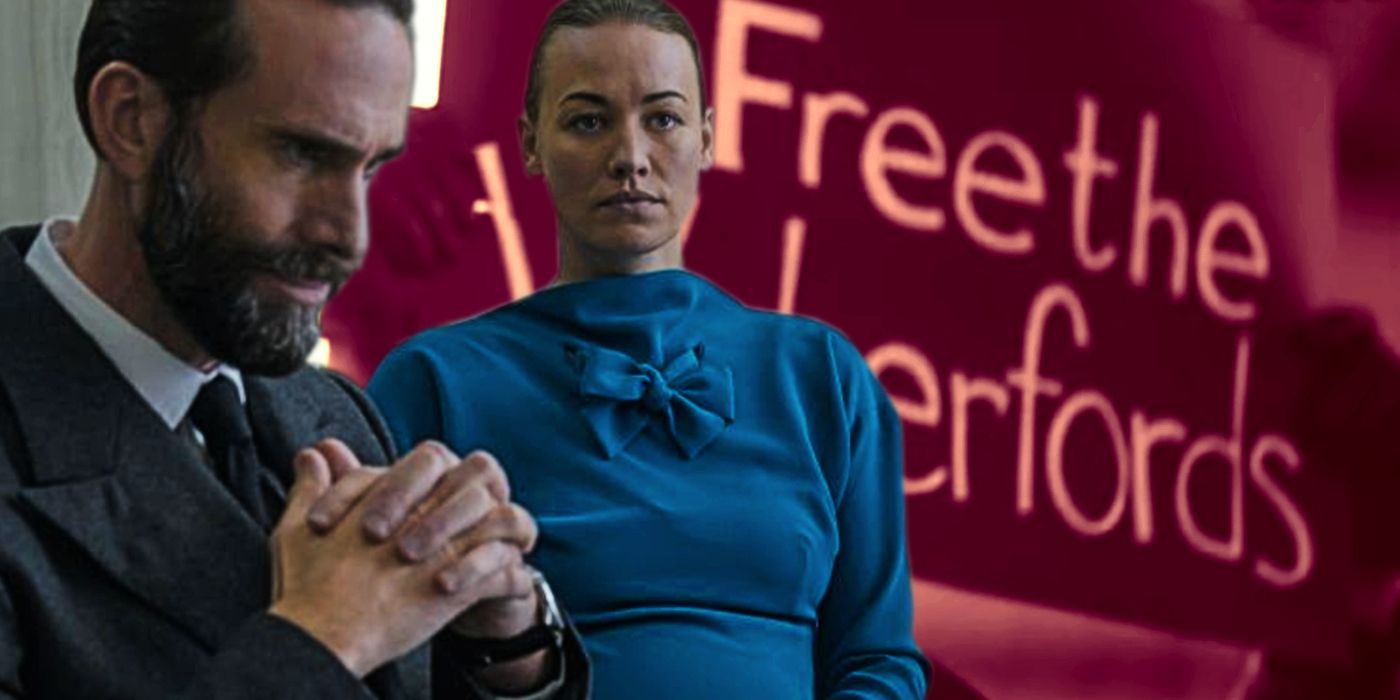June Osborne gives her testimony against Serena Joy and Fred Waterford in The Handmaid's Tale season 4, episode 8, but the outcome is a group of Canadians cheering for the Waterfords and celebrating Gilead. Directed by star Elisabeth Moss, "Testimony" is what June's brief time in Canada has been building to. Going before the International Criminal Court to read her witness statement ahead of the Waterfords' trial, June's testimony serves as a recap of some of the worst horrors from The Handmaid's Tale seasons 1-3. But while June recounts the abuse she suffered at the hands of Fred and Serena, her former Commander hits back. He professes that everything he and Gilead have done is in the name of God, and that their system is working where others around the world are failing. June, obviously, doesn't buy a word of it, but quite clearly several people do, with a group outside the court protesting the apparent injustices the couple are facing.
To viewers, it's always been rather clear that Gilead is in the wrong and that Fred and Serena deserve to be punished for their crimes, so it's a particularly startling moment to see them essentially vindicated like this in Handmaid's Tale season 4, episode 8, even if just by a minority. The moment makes perfect sense, however, because it highlights a key part of Gilead's foundation. While much of the regime's rise was through fear, intimidation, and brutality, it also won people to its cause and gave them something to believe in. Generally, that's been presented as being contained to Gilead, which has often felt somewhat isolated in a North Korea-esque way, with other countries doing what they have to but little actual support for it. So with June in Canada, the feeling was that it was completely safe, but of course, there would be people who sympathize with the Waterfords and support what Gilead is doing.
Gilead Support In Canada Reflects Real-Life Geopolitics
The Handmaid's Tale has always been a politically relevant show, and this very much taps into that aspect once again in Handmaid's Tale season 4, episode 8. It combines political leanings, no matter how controversial or unsavory, with the cult of celebrity. Fred and Serena Joy are influencers in some quarters at least, and to those people they are lauded as figureheads who are telling it like it is and who are prepared to do what must be done. Again, the view of the world is somewhat skewed because Gilead is the place where all the problems have been, with Canada the haven to escape to, giving the sense that it would be more ideal. But "Testimony" is a reminder of the fertility crisis that the entire world is dealing with. Gilead's Handmaid measures are horrific, but it feels realistic that others in other countries, whose governments have not turned things around, would glance in that direction and think they had the right to it.
There is also a minority feeling of ill will toward Gilead refugees in Canada, which again both further reinforces in those people the belief that Gilead is right, as well as making more real-world parallels. As Gilead is weakened and more people come into Canada, then again it fits that those dissenting voices would look to shout louder, and to latch on to the celebrity of Fred and Serena Joy as their hope. It's a marked contrast from Serena's arrival in Canada in The Handmaid's Tale season 3, where she was met by angry anti-Gilead protestors. It's unlikely this is representative of a complete shift, at least, but more indicates that these divisions do exist within Canada, and life outside Gilead, while better, has its own complications — and that even where people are doing evil things, there are those who will support it or turn a blind eye if it benefits them, or if they're living in fear of what the alternative might be.
As The Handmaid's Tale season 5 moves towards its endgame, then the celebration of the Waterfords in Canada feels every bit as pivotal as June's own powerful testimony. It confirms to them the angle they needed to play at the time — the God-fearing, righteous people who are the only ones succeeding in increasing birth rates, who will argue that the ends justify the means, and they are doing the Lord's work, strengthened by Serena's own pregnancy. Fred is shrewd enough to have seen that as his best chance anyway, but the protests and cheers confirmed that taking down the Waterfords wasn't as straightforward as it ought to be.
Canada Didn't Bring The Salvation June Hoped For
The Handmaid's Tale season 4, episode 8 only foreshadowed the challenges Hannah faces. The Handmaid's Tale season 5 has seen more of June's time in Canada as she's visited rebel outposts and tried anything and everything to get Hannah back. However, her journey in Canada hasn't turned out to be a smooth road. When June and the former Handmaids killed Fred Waterford in The Handmaid's Tale season 4 finale, it was thought many of the problems would be solved. Fred's death was wholly necessary, as evidenced by the people's support of the Waterfords. As well, the courts wouldn't remove Fred and Gilead offered no help. Therefore, June took matters into her own hands.
However, since her freedom, June hasn't had an easy time. She's faced hardship upon hardship with her newfound freedom, but it at least still seems more worthwhile to her than being stuck in Gilead. June's struggles in Canada mirror that of many refugees who seek asylum. Often, refugees leave their own countries to go to another, only to find that a new set of problems emerge when they arrive at their destination. So, even though Fred Waterford is dead, and Serena Joy is on her own road to escape, June's problems in The Handmaid's Tale have only gotten more complicated after fleeing to Canada.
Gilead's Relationship With Canada Is Worse In The Handmaid's Tale Books
While The Handmaid's Tale season 4, episode 8, proved that some Canadians are on the side of Gilead, the two territories' relationship is far worse in Margaret Atwood's books. In The Handmaid's Tale novels, Canada and Gilead actually have a fully-formed relationship. While their diplomatic relations are often tense, it doesn't stop Canada from recognizing the Republic of Gilead as its own sovereign nation.
In Toronto, there is both a Gilead embassy and a consulate. In addition, there are missionaries from Gilead (known as Pearl Girls) who are allowed to proselytize in the Canadian streets, and even allowed to bring girls across the border to their territory. Atwood's Handmaid's Tale books also suggest that Canada is eager to stay on Gilead's good side, as Gilead's military leadership is too great a force to be reckoned with. For what it's worth, Canada hasn't been all it's cracked up to be for June and doesn't seem like all that safe a place in The Handmaid's Tale.




